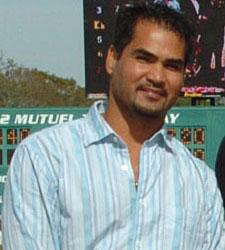Trainer Kirk Ziadie Faces Six-Year Suspension


A Florida administrative law judge has recommended South Florida-based trainer Kirk Ziadie have his racing license suspended for six years and be fined $18,000 for repeated clenbuterol violations.
In a 58-page decision filed Dec. 15 that examined 22 alleged medication violations by Ziadie from 2012-2014, mostly clenbuterol violations, Florida administrative law judge F. Scott Boyd determined Ziadie was guilty of 18 violations and recommended Florida's racing regulator, the Department of Business and Professional Regulation, Division of Pari-Mutuel Wagering, impose the $18,000 fine and six-year license suspension.
Boyd said several circumstances factored in determining the sanctions for Ziadie, a multiple graded stakes-winning trainer who has ranked in the top 100 by wins in six of the past 11 seasons.
Boyd said the number of offenses was significant and indicates a pattern or practice, rather than an occasional oversight. He said such repeated drug offenses have a direct impact on the integrity of the pari-mutuel industry.
Ziadie attorney Bradford Beilly noted that the ball is now in the court of the regulator, who can decide what to do following Boyd's recommendation. Ziadie requested the administrative hearing after the regulator on March 17 alleged multiple medication violations.
In his decision, Boyd also noted that while clenbuterol has some therapeutic value, its adverse effects and excessive use present a danger to racing Thoroughbreds.
On the Association of Racing Commissioners International's Uniform Classification Guidelines for Foreign Substances and Recommended Penalties, clenbuterol is listed as a Class C substance and falls into the second-highest penalty class (Class B). It carries that high penalty class because when administered on a regular basis, clenbuterol carries anabolic effects.
Boyd said 14 prior medication violation complaints against Ziadie that resulted in discipline were introduced, which the administrative law judge said was another aggravating factor in determining sanctions.
Beilly noted that the 18 positives were based on frozen urine samples that were used after a November decision by Boyd found some problems with the chain-of-custody handling of blood samples in Florida. That finding was made Nov. 25 in a separate case in which Ziadie was contending that the Division of Pari-Mutuel Wagering had not acted properly by not granting him a racing license.
In that case, Boyd determined that the regulator had not included, "denial of licensure renewal as a possible penalty in its guidenlines," and recommended that the Division of Pari-Mutuel Wagering allow Ziadie to renew his license but Beilly noted the regulator has not acted on that recommendation to date.
In his Dec. 15 recommendation to suspend Ziadie six years, Boyd found little favor in any of the various defenses offered by Ziadie and his legal team. Some of those arguments included Ziadie's position that there was a change of testing levels for clenbuterol, but Boyd determined that such changes are commonplace, noting, "the evidence showed that testing protocols have been periodically adjusted to establish the minimum amount of a drug that will be reported as positive."
Also, Ziadie acknowledged that even after horsemen were advised May 29, 2013 to shift their withdrawal times for clenbuterol from five to 14 days, he continued with the previous five-day policy. The decision said Ziadie had six 2013 clenbuterol positives after that advisory.
In testimony, Ziadie said he chose not to change to the new, longer withdrawal time.
"I was still stuck on the five days, your honor," Ziadie said. "I was stubborn. I know I did wrong. I know that there was a rumor and I know there was a brochure going around—14 days—but I was trying to do the best for my horses.
"I thought that if was the medication that they needed at the time when we were racing and I take blame for being stubborn and making a mistake, but I did keep it at five days."
Boyd also determined that the regulator followed proper chain-of-custody protocol in handling of samples and denied Ziadie's argument that he was being selectively prosecuted. "Respondent did not put on persuasive evidence that he was treated differently than other similarly situated trainers," Boyd wrote.
In the Nov. 25 recommendation that the regulator allow Ziadie to renew his license, Boyd wrote that testimony indicated contamination or tampering was possible in the handling of blood samples. But Boyd went on to say that, "the mere possibility of tampering or contamination is not sufficient to require proof of a strict chain-of-custody; there must be a probabilty."
Still, to back up its findings from blood samples in the case that led to Boyd's Dec. 15 recommendation, the Division of Pari-Mutuel Wagering used frozen urine samples it retains. In the Dec. 15 decision, Boyd noted that in the re-screening of these samples, supervisors at the labs were aware that the samples were from Ziadie-trained horses and they were not blind tests. Boyd rejected the regulator's argument that if anonymity was preserved when the samples were originally tested that it was no longer required in 2015.
However, Boyd went on to note that the technicians who actually performed the testing were not aware of the horse or trainer tied to the samples. Beilly said violations of rules are not harmless errors.
"If that final order is adopted by the division, we will file the appropriate exceptions to the administrative law judge's ruling that the urine evidence should have been considered since it was taken and processed in violation of the anonymity rules," Beilly said.
The regulator used the frozen test samples in building its case and Boyd noted that while initially Ziadie challenged the scientific validity of the 2015 re-testing of 2012 urine samples, that claim was abandoned. Boyd found no evidence that there was significant degradation from the passage of time of the urine samples that were re-tested.
